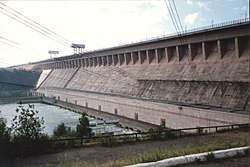Bratsk Reservoir
Bratsk Reservoir (Russian: Бра́тское водохрани́лище, Bratskoye Reservoir) is a reservoir on the Angara River, located in Irkutsk Oblast,[1] Russia. It is named after the city of Bratsk, the largest city adjacent to the reservoir. It has a surface area of 5,470 square kilometres (2,110 sq mi) and a maximum volume of 169.27 × 1012 litres (37.2 × 1012 gallons).[2]
| Bratsk Reservoir | |
|---|---|
 | |
| Location | Irkutsk Oblast |
| Coordinates | 56°15′N 101°45′E |
| Type | Hydroelectric reservoir |
| Primary inflows | Angara River |
| Primary outflows | Angara River |
| Basin countries | Russia |
| Surface area | 5,470 square kilometres (2,110 sq mi) |
| Water volume | 169.27 km3 (137,230,000 acre⋅ft) |
The concrete dam of the Bratsk hydroelectric plant was completed in 1967. It is 125 metres (410 ft) high and 4,417 metres (14,491 ft) long. The Baikal Amur Mainline railroad runs along the top of the dam. At the time of its inauguration, the reservoir was the largest artificial lake in the world.[3] Its electrical power capacity is 4,500 MW.[2]
In literature
The epic construction of the Bratsk Dam is the subject of a large eponymous poem by Yevgeny Yevtushenko. Much later (1976), the impact of the reservoir construction on the life of the villagers upstream, many of whom had to be relocated from the flooded areas, or lost some the best lands of their collective farms, became the motive of Valentin Rasputin's novel Farewell to Matyora. [4]
References
- Partly in the Ust-Orda Buryat Okrug
- Great Soviet Encyclopedia, entry on Братское водохранилище
- George St. George. Siberia: The New Frontier. D. McKay Co, 1969. Page 147.
- Rasputin, Valentin Grigorʹevich (1995), "Foreword (by Kathleen Parthé)", Farewell to Matyora, Northwestern University Press, p. ix, ISBN 0-8101-1329-5 (Translated by Antonina W. Bouis)